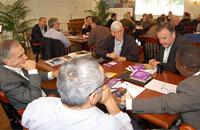The Lausanne Movement, in partnership with the Overseas Council, the International Council for Evangelical Theological Education, Langham Partnership International, the Fellowship of Evangelical Seminary Presidents, and the World Reformed Fellowship, hosted a Consultation on Global Theological Education at Mackenzie University in São Paulo, Brazil, from 2-6 June 2014.
Fifty-six key decision makers within theological education from all over the world participated in this consultation with at least 55 percent of participants coming from majority-world contexts, with a distinctive of the fellowship being the purpose of advancing the cause of world evangelization. The intrinsic link between theological education and mission is well expressed in The Cape Town Commitment Part IIF-4. Theological education is both a worthy end in itself that we seek to strengthen for the glory of God and also a means toward the end of strengthening the church where it exists and establishing the church where it does not. This is the heartbeat of the Lausanne Movement.
Toward that end, the theme of the consultation was ‘Towards Missional Biblical Partnership in Global Theological Education’.
Areas of focus
- Successful missional biblical partnerships
The role of the church in successful South-East-West-North partnerships
Case studies of genuine partnerships
Practical challenges to effective partnerships - Contextualization in theological education
Missional importance and methods
Ways to increase awareness and dissemination of existing work
Place of ‘glocal’ theology - Global and missional sustainability in theological education
Dependency: causes of it and prospects for avoiding it
Equability: ways to establish equable organization-to-organization relationships
Exchanging ideas on sustainable institutions and programs - Formal and non-formal training
Towards a better understanding and appreciation of the relationship
How theological institutions in South and North relate to formal and non-formal training
Background
The Third Lausanne Congress on World Evangelization (Cape Town, 16-25 October 2010) brought together 4,200 evangelical leaders from 198 countries, and extended to hundreds of thousands more participating in meetings around the world and online. Its goal? To bring a fresh challenge to the global church to bear witness to Jesus Christ and all his teaching—in every nation, in every sphere of society, and in the realm of ideas. In particular the Congress, and the global consensus document produced from it, The Cape Town Commitment, called the world’s theological education institutions to an active partnership with other theological institutes, with the church, and with the work of evangelism and church planting.
In response to this call, in May of 2012, 65 key decision makers and leaders of organizations that provide, support, or accredit theological education from 31 different countries gathered on the campus of Gordon-Conwell Theological Seminary in South Hamilton, USA. Over a three-day period, this global community sought to identify the key opportunities and challenges facing theological education, and through this, explore the three themes of the gathering: theological education as a global community, theological education as mission, and the changing role of American seminaries in global theological education.
As this gathering concluded, it was clear that the challenges and opportunities for theological education in the 21st century required the intentional building, and continued working, of a global community. To that end, by consensus it was decided there was a strategic need for a gathering which would provide continuity to the 2012 gathering, and allow a time which would provide exploration and emphasis on practical steps forward which will enhance South-East-West-North partnerships.
Read the news release about this consultation.
